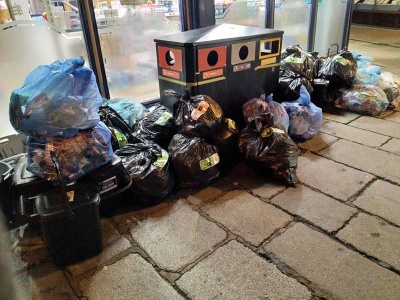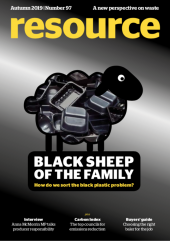Local authority profile: Guernsey's experience with 'pay as you throw'
The ‘pay as you throw’ model to household waste recycling has never taken off in the UK, but since its introduction in Guernsey, could it be one step closer to the mainland. Will Simpson reports.
Pay as you throw’ (PAYT) is an idea that has been kicked around for years as one possible way to incentivise recycling. Used widely in Europe, it’s still regarded as politically unacceptable in the UK. But maybe not for much longer. For in February 2019 Guernsey in the Channel Islands became the first British authority to give it a go, in the culmination of what has been an almost decade-long plan to minimise its residual waste.

Waste management on the island is very different to the mainland. Guernsey comprises just 27,000 households and even within that there is a fragmented local government system with 10 administrative districts each responsible for organising their own waste collection (though three have combined to form one joint venture organisation).
Being an island also brings restrictions. “For several decades we have been relying on landfill for all of our waste disposal,” explains the island’s Waste Change Manager Jim Anderson. “It was clear that we couldn’t continue that indefinitely.” Initially, the crown dependency looked into an on-island energy-from-waste plant. When that was rejected they decided on a strategy based around waste minimisation and high recycling, with residual waste being prepared for export as refuse-derived fuel.
This placed added importance on the first part of that equation. To begin with, a dry recycling kerbside collection was put in place in 2014. Then last year residual collections were switched to fortnightly and a food waste collection launched for the first time. For Anderson, the PAYT scheme is “the final piece” of the jigsaw. “We have made recycling as convenient as possible. So now it’s about encouraging people to think about what they’re throwing out and helping them to realise that there is a cost to it.”
The scheme is administered via a sticker system where residents purchase either a £2.50 or £1.40 sticker which they attach to their 90-litre or 50-litre capacity black bags. Failure to affix the stickers results in a £60 fine and the islanders also have to pay a £85 annual charge to cover the costs of residual waste shipment and processing.
The scheme has involved a great deal of preparation. There were not only legislative changes that had to be pushed through but practical issues to consider: “We had to design stickers that weren’t going to fall off bags. They had to be tamper proof and forgery proof. The retail pack that you buy them in couldn’t contain shrink wrap plastic – we didn’t want to produce additional waste into the system. It was complicated.”
 This article was taken from Issue 97
This article was taken from Issue 97The communication programme involved everything from mailshots to social media to going into the island’s supermarkets to explain the changes face to face. Inevitably, there was an element of resistance from some residents. “There was a lot of noise,” admits Anderson. “There was a bit of confusion and conflation with introducing a PAYT system. It appeared to some people to be a new tax. It’s not. It’s just that we’re switching to a more modern and sustainable means of dealing with our waste and it’s a new way to spread the added cost.”
Despite that, Anderson reports that the level of compliance has been “very high” since the charge was launched with participation rates of around 80 per cent. Early indicators show that the impact has been felt in recycling figures. From a rate that was around 45 per cent before the changes the island’s recycling has gone up to over 60 per cent. Meanwhile in the same period residual waste looks to have decreased by around 20 per cent.
PAYT appears to have achieved its objectives in Guernsey, but could it work over on the mainland? Anderson is careful not to appear too evangelistic: “I know it’s spoken about. I know too that the legislation that is currently in place in the UK is an obstacle. There are obviously huge political challenges to overcome before anything else could happen.”
“But in terms of driving behaviour and focusing attention on waste reduction we have found it to be a beneficial thing. It has very sound logic. It’s the polluter pays principle, isn’t it? I know the Resources and Waste Strategy has come out, so whether it will be considered in the future...well, we’ll have to wait and see.”









